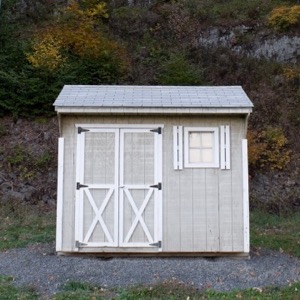
Utah-based Neighbor, which aims to be the Airbnb of storage, recently announced its entry in the North Texas market. Courtesy of Storyblocks.
April 28, 2020
Sometimes it seems you can hardly turn a corner in the Metroplex without passing another new self-storage complex. Not typically architectural gems, the properties tend to be large, concrete- and asphalt-intensive and they seem to be multiplying.
Like them or not, they do answer a burning question: What do I do with all this stuff?
But Joseph Woodbury thinks he’s figured out a better, cheaper and more environmentally friendly way for people to squirrel away their surplus gear.
 Joseph Woodbury and two college friends started Neighbor in 2017. Courtesy of Neighbor.
Joseph Woodbury and two college friends started Neighbor in 2017. Courtesy of Neighbor.
Woodbury is the CEO and co-founder of Neighbor, an online peer-to-peer shared-storage business in which people rent out vacant space at their private residence or property. The Utah-based company was founded in 2017 by Woodbury and his college buddies from Brigham Young University and University of Utah, with the tagline “Store your stuff with a neighbor.”
The company recently announced its entry into the DFW market.
Have an old car but no place to park it? Someone a couple of streets over may have an unused garage ready to be occupied.
“We're on a mission to eliminate the need to build more cement and steel buildings just to house our items,” Woodbury said. “Instead, we believe in working hand in hand with our neighbors to share our existing storable space while providing a stream of extra revenue to hosts, and a more affordable and convenient storage solution for renters. Why not just use the space that has already been built instead of building new space?”
There is no fee to join Neighbor. Signing up involves visiting the Neighbor.com website or downloading the Neighbor app and clicking "List a Space." Hosts get a $1 million general liability guarantee, while items stored are insured for up to $25,000. Illicit materials are forbidden, and security measures include a requirement that all items to be stored are documented.
Neighbor makes its money through a sliding-fee scale, based on the amount of the rental transaction. In all cases, storage-space owners receive the full amount they’re charging. The added fee is paid by the person using the space. Even so, the company claims renters save an average of 50 percent on storage costs compared to rates charged by conventional storage businesses.
 Clean out your storage shed and rent it to people looking for extra space on Neighbor.com. Storyblocks.
Clean out your storage shed and rent it to people looking for extra space on Neighbor.com. Storyblocks.
Woodbury sees Neighbor as a disruptor to an environmentally unsound business model.
“In America, we’ve built nearly 2 billion square feet of storage units, enough to fit every man, woman and child simultaneously in a storage unit. These units are built almost entirely out of cement and steel,” he said. “To make matters worse, these storage facilities generate additional emissions by sucking energy for climate-controlled units and lighting. And their renters must drive an average of 25 to 35 minutes to access their items, further polluting our skies. This industry is pursuing rapid growth, spending an average of $5 billion each year to construct new concrete and steel buildings.”
The self-storage industry is not blind to the benefits of environmental sustainability, however. An example is StorQuest, which is partnering with the reforestation nonprofit One Tree Planted to add trees to the world with each rental. The company is also involved in nature-conservation projects in New York and California. StorQuest operates two sites in Dallas and one in Fort Worth.
While Neighbor certainly is not the only online forum enabling residents to lease out their space (see Craigslist), it adds a unique combination of insurance protection and built-in security measures that other sites lack, and its focus is very specific: peer-to-peer storage.
And Woodbury notes that for the legions of Americans left suddenly jobless by the Covid-19 pandemic, or those facing dramatically scaled-back work schedules, renting out storage space can provide reliable passive income. Those confined to their homes may find that such a revenue stream “can make the difference when paying utility bills or mortgage payments,” Woodbury said.
Stay up to date on everything green in North Texas, including the latest news and events! Sign up for the weekly Green Source DFW Newsletter! Follow us on Facebook and Twitter. Also check out our new podcast The Texas Green Report, available on your favorite podcast app









